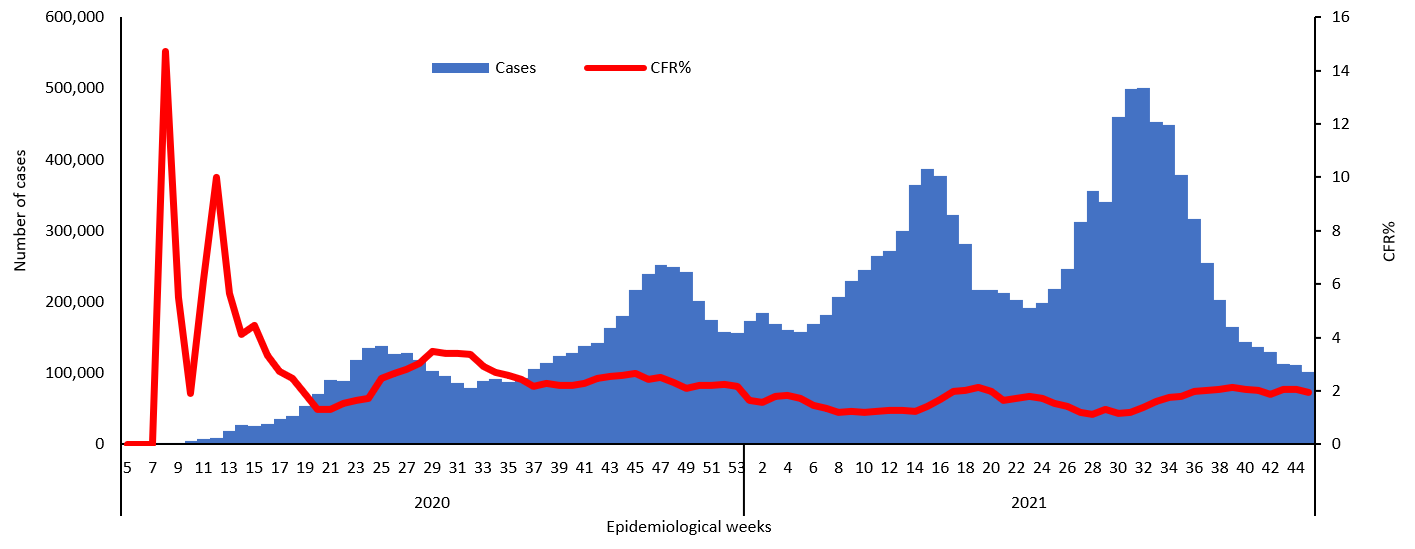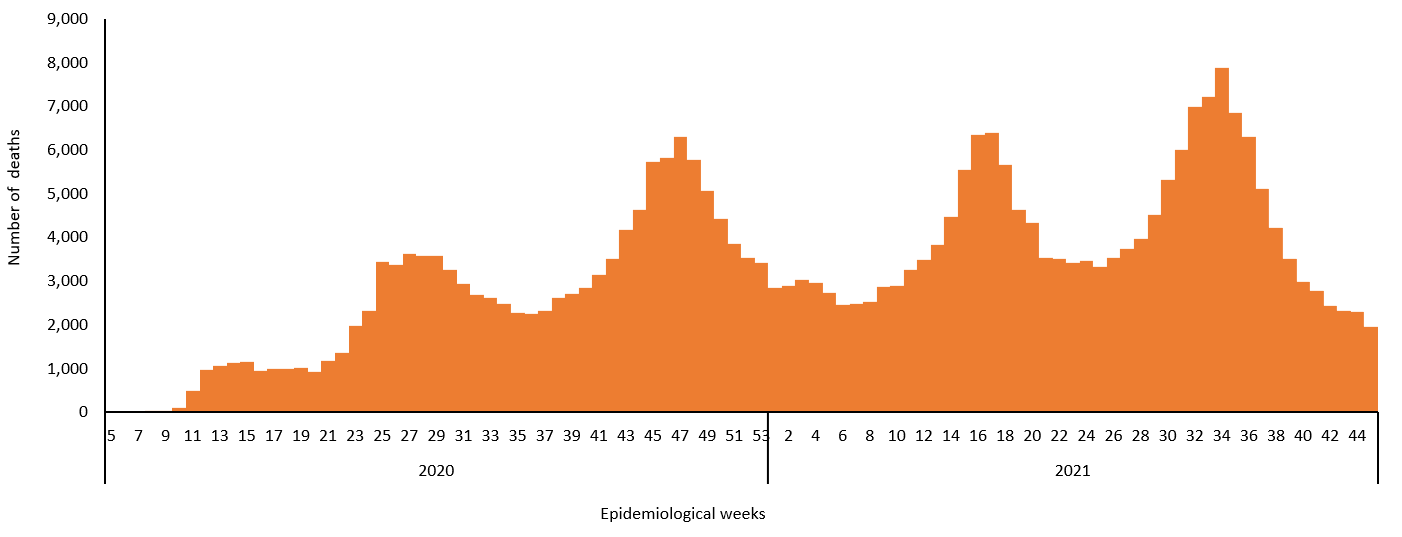The coronavirus disease COVID-19 continues to spread at the regional and global levels. As of 13 November 2021, the global cumulative incidence reached 252 253 882 reported cases and 5 084 501 associated deaths with a case fatality ratio (CFR) of 2%. Meanwhile, the 22 countries of the Eastern Mediterranean Region (EMR) have reported a total of 16 565 402 cases, which represent about 6.6% of the global count, with 305 431 associated deaths (CFR 1.8%). Most countries in the Region are in the community transmission phase.
Since the beginning of the outbreak, the country that has reported the highest number of total cases in the Region is Islamic Republic of Iran (6 031 575 cases; 36.4% of the Region’s total), followed by Iraq (2 068 388; 12.5%) and Pakistan (1 279 636; 7.7%). Islamic Republic of Iran also reported the highest number of total associated deaths (128 042; CFR 2.1%) followed by Pakistan (28 606; CFR 2.2%) and Tunisia (25 308; CFR 3.5%). The highest CFRs were reported by Yemen (19.4%) followed by Sudan (7.4%), while the lowest CFRs were reported by Qatar (0.25%), United Arab Emirates (0.29%) and Bahrain (0.5%).
During epidemiological week 45, the Region reported a decrease in cases of 9.1% when compared to the previous week (101 678 cases compared to 111 823 cases). Similarly, a decrease of 14.9% was observed for associated deaths (1961 deaths compared to 2303 deaths).
Syrian Arab Republic, Egypt and Jordan reported a relative increase in COVID-19 activity in week 45. The cumulative number of cases increased from 44 899 to 46 130 in Syrian Arab Republic (a 2.7% weekly increase), and from 336 582 to 343 026 in Egypt (a 1.9% weekly increase) and from 873 707 to 889 671 in Jordan (a 1.8% weekly increase). Egypt, Syrian Arab Republic and Libya had the largest relative increase in deaths.
In terms of testing, a total of 262 721 922 laboratory PCR tests were conducted since the start of the outbreak across the Region including 4 145 467 tests in week 45, which shows a 2.3% decrease compared to the previous week when 4 241 951 tests were conducted. The highest number of PCR tests were reported from United Arab Emirates (96.8 million), followed by Islamic Republic of Iran (36.9 million) and Saudi Arabia (30.8 million). The United Arab Emirates and Bahrain are performing the highest rates of testing per capita (9686/1000 and 4076/1000, respectively). The average positivity rate for the Region is 6.3%. WHO recommends a positivity rate of around 3–12% as a general benchmark indicating adequate testing, which was achieved in most countries of the Region.
Meanwhile, COVID-19 vaccination continues across the Region. The total number of doses administered so far in the 22 countries is 406 568 490. Pakistan has administered the highest number of doses at 118 333 360, followed by Morocco at 48 083 925 and Saudi Arabia at 46 738 919. On the other hand the total number of administrated doses in Sudan is 2 111 141, in Libya is 2 096 601, in Syria is 1 125 146, in Somalia is 691 649, in Yemen is 547 019 and in Djibouti is 92 097.*
Supporting countries in the Region
The regional incident management support team continues to coordinate the response and provide technical support to countries and partners in the Region in the areas of coordination and partnership, surveillance, laboratory capacity, clinical management, infection prevention and control, risk communication and community engagement, points of entry according to the International Health Regulations (2005), research, health systems, and essential health services among others.


For more data from the Region, please visit the COVID-19 dashboard.
*The data on vaccination is obtained from a number of sources including media reports and country websites for ministries of health.
Subscribe to the monthly infectious hazard preparedness newsletter of WHO’s Health Emergencies Programme for latest data and analysis on epidemic- and pandemic-prone diseases, as well as news on outbreak preparedness and response within WHO’s Eastern Mediterranean Region.



